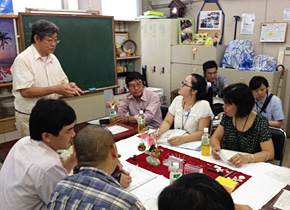Aiming to form a “sphere” that widens the circle of exchanges between Vietnamese and Japanese companies (July 22-Aug. 2, 2013)
Held by JICA, this seminar marked its fourth term this fiscal year. Tying up with Panasonic Excel International, PREX welcomed 25 seminar participants and two staff members of the Vietnam-Japan Human Resources Cooperation Center from July 22 to August 2. This year, activities in the Tokyo Metropolitan Area were added for the first time. In addition with learning about the manufacture of high-quality products by Japanese companies and Japanese-style management, the theme of exchanges with a larger number of Japanese companies was implemented during the schedule spanning two weeks.

At all the companies visited, the participants came into direct contact with high levels of manufacturing, quality and development power.
An agenda in the Tokyo Metropolitan Area, a first for the seminar
This time around, we received the seminar participants in Tokyo, as the seminar was designed so that the first half included destinations and lectures in the Tokyo Metropolitan Area. In addition to lectures on quality, Kaizen and the economies of Japan and Asia, there were visits to small and medium-sized enterprises (SMEs) in Tokyo’s Ota Ward and Kawasaki City. In particular, the participants learned about the inexhaustible responses to “only one” product development and clients’ needs and about human-resource development at the two companies in the Okawacho district, thanks to arrangements made by the Kawasaki Chamber of Commerce and Industry. Moreover, they learned of the trusting ties forged through managers of both companies unfailingly providing employees with training opportunities after joining the company and sustaining the motivation to practice techniques and creating close links with the families that span public and private lives. The seminar participants sensed a discrepancy with their own country in how efficient technologies are effectively maintained by skilled engineers.
Exchanges with companies in Kansai
Following on from last year, exchange sessions were held through the kind cooperation of the Kansai Bureau of Economy, Trade and Industry. Twelve managers and executives from 10 SMEs in Kansai, an increase from last year, and the business course participants were divided into two groups. Discussions were held on “points for successfully inducing dealings between Vietnamese and Japanese companies” and “specific know-how on cutting manufacturing costs.” Along with learning about the importance of quality and the methods behind Japan’s meticulous cost management, the participants developed a path of awareness to the importance of holding continuous exchanges for the sake of mutual understanding. Apart from the exchanges with business managers, the participants visited large corporations that have already advanced into the Vietnamese market, medium-sized enterprises with such plans close at hand, and technical schools and others that accept Vietnamese students, provide them with Japanese language education and give them guidance on business in Japan, and, moreover, encourage them to continue on to Japanese universities and find work for them with Japanese companies. On numerous occasions at many of the field-trip destinations, there were opportunities for Vietnamese employees and the participants to interact.
All the companies extended us a warm welcome and provided kind advice and guidance on the field trips. Furthermore, we also witnessed many scenes of opinion exchanges and business discussions taking place, going one step beyond human-resource exchanges and business.
87 people come to Japan in 4 years, 52 companies involved
The number of students who have completed activities of the four-term Vietnam Business Course over the last four years has reached 87, with many of them from remarkably vigorous Vietnamese companies (numbering 52). Especially noteworthy is that seven of the 20 companies taking part this last time are repeaters in terms of sending us participants. One of them, FECON Co. (a Hanoi-based construction company), have had management executives participate for four terms running.
PREX has advocated the strengthening of the activities of alumni associations as a way of creating a “sphere” for exchanges between those who complete the training program and SMEs in Kansai that are considering opening businesses in their country, in order to maintain continuing relations even after the seminars wrap up.
The Vietnam Business Course will continue its activities in the next fiscal year as well. Perhaps in the future, the course will become a status system for managers in that country? And as a group that brings together promising companies, we expect it to give rise to corporate collaboration in both countries and acquire a great deal of power in Vietnam’s industrial development and for Japan’s economic recovery.
Shogo Asanuma, International Department
Seminar summary
| Name | Practical Training Business Course (Vietnam-Japan Center) |
| Period | July 22 (Mon.)-Aug. 2 (Fri.), 2013 |
| Participants | 25 people of the Vietnam-Japan Center “Business Course” and 2 staffers from the center (Business course participants included managers and executives at Vietnamese companies and university instructors) |
| Commissioned by | Panasonic Excel International Co. |


